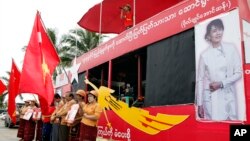One month prior to elections in Myanmar, the human rights group Amnesty International is accusing the government of returning to its old ways of repression.
The London-based organization, in a report being released Thursday, rebuts the government's assertion that no one is being imprisoned for peacefully exercising his rights.
Amnesty contends the pace of repression has drastically escalated in the last two years, with at least at least 91 “prisoners of conscience” currently behind bars in Myanmar.
“The charges that activists are being arrested and detained under are carrying longer prison sentences. They're being charged very frequently with so-called non-bailable offenses, which means they're kept in pre-trial detention,” said Laura Haigh, Amnesty's Myanmar researcher. “From the start of 2015, this appears to have intensified. And we believe that this is in the run-up to the election. Essentially, we think the Myanmar government is playing the long game, trying to get critical voices off the street.”
During the current campaigning for the November 8 general election, however, there are no known such detentions.
“The Myanmar government knows that the world is watching, so I think it's unlikely that we're going to see many arrests in the election period,” Haigh told VOA.
A sweeping presidential pardon at the end of 2013 led to the release of virtually all political prisoners.
Among those currently held are human rights defenders, lawyers, opposition activists, students, trade unionists and journalists.
Student leader Phyo Phyo Aung is facing more than nine years in prison for organizing protests against a new law that restricts academic freedom.
In a VOA interview at a demonstration at Yangon University last November, the activist said her fellow students were protesting for “a democratic education, an autonomous university and a freedom of education” in a country she decried as having the lowest quality of education in Asia.
Next month's polls will be the first general election since a nominally civilian government was installed in 2011. But, with the military still firmly in control of the process, there is widespread speculation about whether the election will be free and fair.
More than 6,000 people are running for positions in the national parliament and regional legislatures. However, at least 75 independent or opposition party candidates were disqualified, many because of the citizenship status of their parents.
Among them are about 15 of 18 candidates from the Democracy and Human Rights Party, a Muslim majority party whose candidates tried to run in the Rakhine state constituencies.
The leaders of predominantly Buddhist Myanmar have refused to acknowledge the primarily Muslim Rohingya minority group, most of whom live in Rakhine.
Myanmar considers the Rohingya as illegal immigrants from Bangladesh, which also does not recognize them as citizens.




